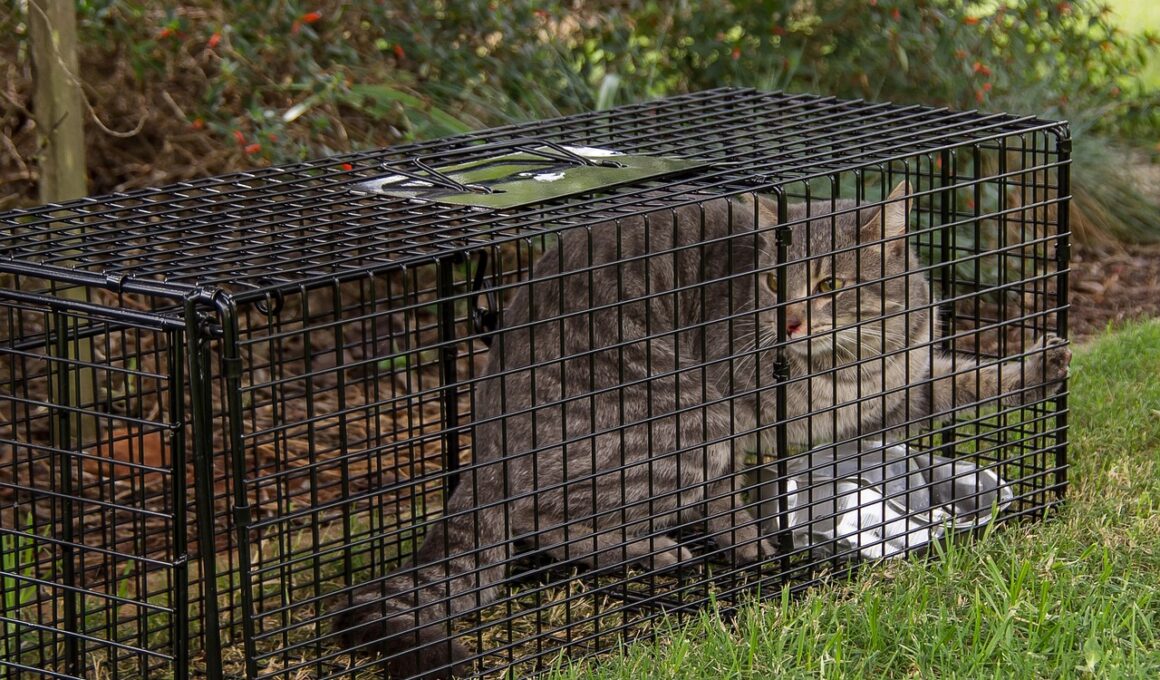Reducing Parasite Risks for Cats Using Green Methods
Parasites can be a significant concern for cat owners, especially in maintaining a healthy living environment. Many traditional parasite control methods utilize harsh chemicals that may pose risks to pets and humans alike. Adopting eco-friendly options allows the reduction of these risks while effectively managing parasite populations. First, it’s important to understand the types of common parasites affecting cats, which include fleas, ticks, and worms. Each parasite has different life cycles and requires targeted approaches for control. Thus, effective prevention starts with awareness of these parasites and the life cycle they undergo. Eco-friendly techniques such as regular cleaning of your home environment can effectively minimize their presence. For example, vacuuming carpets and upholstery can remove flea eggs and larvae, which is a simple yet crucial step in your cat’s parasite prevention strategy. Furthermore, using diatomaceous earth can provide an organic alternative to chemical treatments, serving as a natural insecticide that can help eliminate these pests. Overall, choosing eco-friendly methods not only protects your cat but contributes positively to the overall health of your home and environment.
One essential component of effective parasite control in cats is maintaining a clean living environment. Regular housekeeping can dramatically reduce the risk of infestations. This process includes frequent vacuuming, washing bedding, and cleaning any areas where your cat may spend time. When cleaning surfaces, consider using natural cleaning solutions like vinegar or baking soda as alternatives to chemical-based products. These are helpful in breaking down the dirt and removing parasites without exposing your pets to harmful substances. Additionally, consider sealing cracks and crevices in your home where parasites might enter, thereby preventing them from establishing a presence. Trimming your cat’s hair can also eliminate hiding spots for fleas and ticks, making it easier to spot any infestations early on. Regular grooming is therefore essential; using a comb specifically designed to catch parasites can be very effective. Ensure your grooming tools are clean to avoid transferring any parasites. By prioritizing cleanliness, you will not only help minimize parasites but also promote a healthier environment for your cat to flourish and thrive in their habitat.
Natural Remedies for Flea and Tick Control
Flea and tick control can be effectively managed by utilizing numerous natural remedies. One popular method is using essential oils such as lavender, peppermint, and cedarwood, which can repel fleas and ticks. Always remember to dilute these oils appropriately before applying them to your cat’s fur. It’s crucial to consult with your veterinarian prior to using any essential oils, as some can be harmful to cats in concentrated forms. Another natural approach is creating a flea-repellent spray utilizing vinegar and water in equal parts, acting as a natural barrier. This mixture can be sprayed on your cat’s environment but should always be tested on a small area first to prevent any adverse reactions. Additionally, adding fresh herbs to your cat’s diet, such as thyme or rosemary, can help boost their natural defenses against parasites. Making informed choices regarding foods is critical as it contributes to their overall health. Utilizing natural treatments provides a balance of keeping your pets safe while effectively combating fleas and ticks without exposing them to harmful chemicals that can accumulate in their systems.
Another effective eco-friendly alternative in managing internal parasites, such as worms, is through dietary supplementation. Many cat owners may not be aware that certain natural additives in your cat’s diet can assist in parasite control. Pumpkin seeds, for instance, contain compounds that may paralyze worms, preventing them from attaching to the intestinal walls. Ground pumpkin seeds can be easily added to your cat’s food. Furthermore, food rich in omega-3 fatty acids, such as fish oil, can support your cat’s immune system while also driving out worms. Probiotics can improve gut health, making it less hospitable for parasites to thrive. Including probiotics in your cat’s diet as a preventive measure can significantly help maintain a healthy balance of flora. Monitoring your cat’s health and seeking routine veterinary check-ups can ensure that if any issues arise, they can be managed promptly. Ultimately, an integrated approach combining nutritional support, natural remedies, and regular health evaluations can provide a holistic pathway toward effective parasite control.
The Importance of Regular Vet Check-ups
Consulting with a veterinarian regularly is crucial for maintaining your cat’s overall health and preventing parasite infestations. Your vet can offer personalized advice tailored to your pet’s specific needs and risk factors associated with their environment. During check-ups, your vet can administer necessary treatments or vaccinations that help control parasite populations proactively. Additionally, they can perform fecal tests to check for the presence of intestinal parasites that may not show obvious symptoms. Understanding your cat’s lifestyle will help in assessing their risk level for parasites. For example, if your cat spends time outdoors, the risk for fleas and ticks increases significantly. Thus, your veterinarian may recommend preventative treatments specific to these risks. They may also recommend diets that could help improve your cat’s resistance to parasites. Keeping an open line of communication with your veterinarian creates a strong partnership towards your cat’s health. Always keep track of your cat’s health records, as this information can be valuable in determining any changes over time, guiding future treatment, and enhancing effective parasite control solutions.
In addition to consultations, keeping your home environment safe for your pets should be a priority. Ensure that any outdoor space where your cat roams is well-maintained and devoid of potential parasites. This includes regular lawn maintenance to control weeds and overgrowth, which can provide shelter for pests. Establishing a barrier using natural repellents like citronella or lemongrass around your garden can deter unwanted insects. Ensure that your cat is encouraged to stay in specific areas that are safer and easier to monitor. Using natural pest deterrents, such as mulching with cedar shavings, can provide additional protection while maintaining an eco-friendly approach. Teaching your cat boundaries could limit their exposure to risks. Creating a routine whereby your cat is regularly checked for fleas and ticks after outdoor play is vital. Implementing these safety measures, in conjunction with regular vet visits, can make an enormous difference in your cat’s well-being. A combined effort towards cleanliness and vigilance greatly contributes to reducing the risk of parasites and protects your home from infestations.
Educating Yourself and Others
To further strengthen your parasite control strategies, educating yourself and fellow cat owners about effective practices is invaluable. Join local pet owner forums or groups that focus on holistic and eco-friendly cat care sharing experiences and tips. Attend workshops or webinars dedicated to natural pet care, which can expand your knowledge base and expose you to new ideas. Always consider sharing useful information with your friends and family, helping them better care for their pets too. In addition to personal education, advocating for responsible pet ownership fosters a community committed to reducing the prevalence of parasites. By promoting discussions on these topics, we can collectively raise awareness, and help fellow cat owners from a variety of backgrounds understand the importance of eco-friendly pest management. Your experiences can encourage changes and inspire others to seek alternatives to harmful chemical treatments. Ultimately, fostering a mindset towards sustainable practices supports the health of all pets and the environment they inhabit, creating safe spaces where both pets and humans can thrive together harmoniously.
Finally, practicing patience and consistency is key to successfully managing parasite control in your home. The process may take time as you implement different approaches and observe their effectiveness on your cat. Regular observations of your cat’s behavior and overall health can provide insights into what works best for their specific needs. Stay committed to a routine that integrates regular grooming, cleaning, and healthy dietary practices to construct a supportive environment. Recognize the signs of potential infections early, such as excessive scratching, vomiting, or changes in appetite, as prompt intervention is vital. Consult with a veterinarian if you ever have any concerns, especially regarding any natural remedies or dietary changes you introduce. Keep in mind that every cat is unique, and what works for one may not work for another. Exploring various methods while engaging in continuous learning sets you on the path toward a greener, healthier lifestyle for your feline companion. Remember, maintaining an eco-friendly approach not only aids your cat’s health but also protects the environment and benefits society as a whole.


